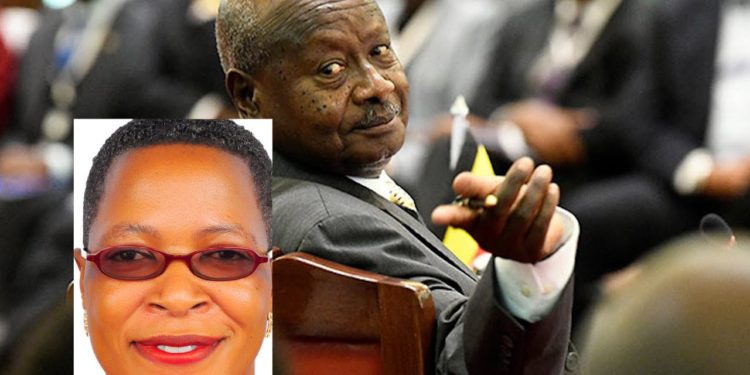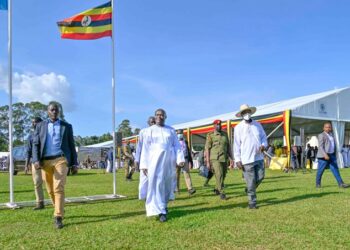In the heart of the parliamentary chamber, amid the fervor of legislators reconvening to debate the 2024/25 budget appropriation bill, Speaker Anita Among took the floor with a proclamation that reverberated through the walls of democracy: “Members of parliament are not corrupt.” Her assertion, delivered with an air of unassailable authority, flies in the face of glaring evidence, widespread public outcry, and even the President’s condemnation of a deeply entrenched corruption cartel within the government.
This brazen declaration from Among comes at a juncture where the integrity of Uganda’s legislative body is under intense scrutiny. The president’s recent State of the Nation Address did not mince words in exposing the rot within parliament. He delineated a nefarious network involving MPs, ministry officials, and other key players in financial malfeasance. Yet, in a stunning display of cognitive dissonance or calculated deflection, Among has chosen to shield her colleagues, asserting their innocence despite their growing criminal records.
The judiciary has already taken significant steps, with five MPs currently behind bars. Yusuf Mutembuli, Cissy Namujju, Paul Akamba, Michael Mawanda, and Mudimi Wamakuyu are embroiled in scandalous corruption charges. These individuals are accused of heinous abuses of power, from soliciting bribes from the Uganda Human Rights Commission to siphoning off vast sums earmarked for cooperative compensations. Among’s dismissal of these charges not only undermines the judiciary’s efforts but also emboldens those engaged in corrupt practices.
In a grotesque display of tribalistic favoritism, Among’s defense of Cissy Namujju exemplifies her brazen disregard for the principles of justice and accountability. Her audacious statement—suggesting it is preferable to have a thief who shares ill-gotten gains rather than one who hoards them—betrays a moral bankruptcy that should disqualify her from any position of public trust. This stance is not merely controversial; it is a flagrant endorsement of corruption, repackaged as communal benevolence.
Among’s rhetoric presents a dichotomy: the ‘presumption of innocence’ she champions for her fellow MPs starkly contrasts with President Museveni’s call to eradicate the corruption that festers within the ranks of the government. This contradiction raises serious questions about her motivations and allegiances. Is Among genuinely blind to the pervasive corruption, or is she complicit, protecting her interests and those of her allies?
The arrested MPs, Mutembuli, Namujju, Akamba, Mawanda, and Wamakuyu, represent a cross-section of the pervasive graft that plagues Uganda. The charges they face are not trivial. They have allegedly exploited their positions to extract kickbacks and misappropriate substantial funds. Mutembuli, Namujju, and Akamba’s involvement in extorting a 20% cut from the enhanced Human Rights Commission budget is a gross violation of the public trust. Their actions reflect a cynical manipulation of power for personal gain, undermining the very essence of their roles as public servants.
Michael Mawanda and Mudimi Wamakuyu’s alleged misappropriation of 164 billion shillings intended for cooperative compensations reveals a level of greed and disregard for public welfare that is staggering. These funds, meant to uplift and support cooperatives, have instead become fodder for the corrupt appetites of those entrusted with their oversight. Akamba’s dual involvement in both extortion schemes underscores a pattern of habitual corruption that must be met with severe legal repercussions.
Speaker Among’s attempt to sanitize these actions by invoking the presumption of innocence while decrying the judiciary’s interventions is not only hypocritical but also a dangerous subversion of the rule of law. Her insistence on the incorruptibility of MPs, even as they languish in prison cells, is a transparent effort to deflect attention from her administration’s failures and the endemic corruption within parliament.
This narrative she is pushing—one that downplays the gravity of corruption allegations and frames the indicted MPs as victims of a misunderstood judicial process—only serves to erode public confidence in the parliamentary system. It suggests that those in power can evade accountability, perpetuating a culture of impunity.
Uganda stands at a crossroads. The fight against corruption demands unwavering commitment from all branches of government, yet Speaker Among’s posture suggests a reluctance to confront this scourge head-on. Her comments not only betray a fundamental misunderstanding of the accountability required of public officials but also signal a worrying complicity in the very corruption she purports to decry.
The citizens of Uganda deserve a parliament that is beyond reproach, one that serves with integrity and transparency. Among’s defense of corrupt MPs does a disservice to this ideal, portraying parliament as a sanctuary for the corrupt rather than a bastion of democracy. Her remarks should galvanize citizens, civil society, and honest legislators to demand greater accountability and to resist the normalization of corruption in public office. Speaker Anita Among’s dismissive stance on parliamentary corruption is not just controversial; it is a direct affront to the principles of justice and good governance. Her attempts to absolve corrupt MPs under the guise of presumption of innocence and her tribalistic defense of convicted criminals are indefensible. It is imperative that Uganda confronts this cancer within its political system with unflinching resolve, lest the entire democratic framework be undermined by the very leaders entrusted with its preservation.







Discussion about this post